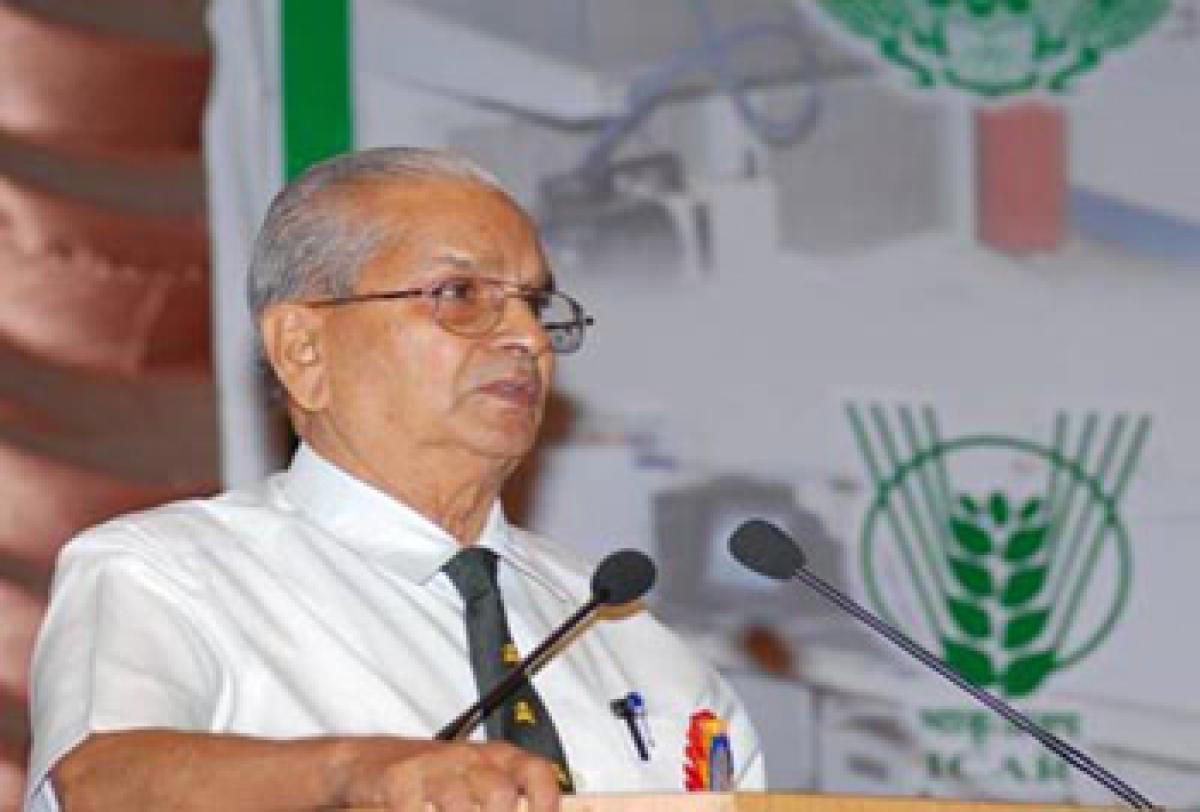Dr M V Rao An eminent scientist & visionary

As a junior colleague of Dr M V Rao, in ANGRAU, I got the benefit of interacting with him several times. Naturally, that has given me an opportunity to observe his professional involvement and versatile style in handling administration, besides his personal likes and dislikes.
Mangina Venkateswara Rao, popularly known as M V Rao, a great agriculture scientist and former Vice-Chancellor of Acharya NG Ranga Agriculture University (ANGRAU), breathed his last after brief illness on March 10 at the age of 87. His mortal remains were confined to flames at Swargavatika near Tirumalagiri in Hyderabad on Thursday. Born into an agriculture family in Narsapuram in West Godavari district, the agriculture scientist after obtaining the PhD in agriculture in the United States of America in 1960 preferred to return to the country to work for the betterment of the farming community. He worked at the Indian Council for Agriculture Research in various positions. He was the recipient of Dr Norman Borlaug award for his services to the agriculture. He was instrumental in increasing production of wheat and oil seeds in the country. Prof Aldas Janaiah, principal of Agriculture University, Prof Jayashankar Telangana State Agriculture University, recalls that Dr M V Rao was instrumental in achieving edible oil self-sufficiency in 1985-90 during Rajiv Gandhi regime by leading the oil seed technology mission. Dr Rao encouraged the juniors, critically acclaiming their work, he adds
Dr Rao ushered in Wheat Revolution
As a junior colleague of Dr M V Rao, in ANGRAU, I got the benefit of interacting with him several times. Naturally, that has given me an opportunity to observe his professional involvement and versatile style in handling administration, besides his personal likes and dislikes. Dr M V Rao, as an associate of Prof M S Swaminathan, was the first person to evaluate the spring wheat (suitable for India) impregnated with dwarf gene (norin) during 1961-63.
The success of rust disease-resistant dwarf gene wheat could be traced with the works of trio Drs M V Rao, Mathur and Kohli of ICAR. Dr Rao’s close association with Prof MSS and Dr Norman Borlaug resulted in the emergence of lerma rojo, sonoro, mayo like base wheat lines that was precursor to the wheat revolution in India. Prof M S Swaminathan, on the event of his 90th birthday (7-8-2015) celebrations in Chennai, recalled the commendable role of Dr Rao in the gigantic task of breaking yield barriers of wheat, through technologies of public research.
Dr Rao basically was a pathologist-cum-breeder from pure science side, who could expand his horizons and established records in agricultural profession unlike many of the recognised Indian scientists. With this background and wide professional experience in all parts of India and the world, he used to express inconvenience for the existing narrow professional walls as well as social and political barriers erected in AP. His attempts to narrow down such barriers as administrator were diluted by conservatives in the specific field of specialisation.
His attempts to integrate research, teaching and extension in agricultural university were also not taken seriously. Naturally that reflected in deficiencies of university, which could not play vital role to solve serious technical problems at ground level. That has paved way for domination of private proprietary inputs in agriculture, as is evident with crop seeds/varieties.
As an entomologist of cotton and professor and head of a department, I got an opportunity to interact with him whenever pest problems on crops used to surface in AP. Even as an ICAR expert he used to evaluate research projects and guide youngsters. He used to evince interest on the projects related to integrated pest management (the crux of sustainable agriculture) where in my role in university was recognised by awards because of him.
As head of university he was distinct in decentralisation and funds apportioning in a fitting manner. He was instrumental in procuring more resources for improving laboratories and centres for better research. He along with his directors and deans used to spend hours together in the research fields and colleges of all corners of state and advice the scientists for their improved approach of professional fields. He was instrumental in running Netherlands project for improving and expanding research in Bio-technology, even after retirement from active service.
Dr Rao, as a member of legislative council and as chairman of several expert committees appointed by the government played a constructive role. He used to take part in children’s’ science festivals organised by Jana Vignana Vedika, a promoter of People’s science movement in the state. His abilities to communicate science with appropriate examples used to attract children and elders as well as farmers and scientists. He was instrumental in organising several kisan melas in the state to bridge gap between lab and land.
All concerned, from field-level workers to policymakers and executers related to agricultural development of Andhra and Telangana states, owe Dr M V Rao a lot and get inspired from his way of life and contributions to the field of agri sciences. (The writer is a retired Professor, ANGRAU, Guntur)














